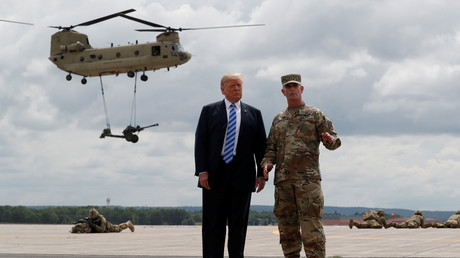NDAA sought to derail Open Skies & New START treaties with Russia
The 2019 military funding bill signed by President Donald Trump sought to limit US participation in Open Skies and New START treaties with Russia, but the provisions were watered down in talks between the House and the Senate.
Trump signed the $716 billion bill on Monday, meaning it would go into effect before the new fiscal year arrives in October, for the first time in years. Speaking at Fort Drum in New York, the president praised the quality of US weapons and troops and promised the continuation of Washington’s military supremacy.
In addition to the highest-ever US military budget, some lawmakers sought to insert several provisions into the NDAA that would have released Washington from nuclear arms treaties with Moscow and effectively suspended the treaty on air surveillance approved at the end of the Cold War.
Section 1233 of the National Defense Authorization Act (NDAA), as passed by the House, would have claimed that Russia was in material breach of the 1987 Intermediate-Range Nuclear Forces (INF) Treaty, and that the US was therefore legally entitled to suspend adhering to it. The Senate amendments changed the policy statement into a “sense of the Congress” and removed the funding limitations imposed by the House, according to the conference report of the final bill.
The House would have also prohibited (Section 1240) funding for implementing the 2010 New START nuclear arms control treaty, until Trump certified he raised the issue of Russia’s new nuclear weapons systems with Moscow. It also demanded to receive written agreement from Russia that such systems would be subject to the treaty. The Senate amendments removed the funding limitation and modified the reporting requirements.
Senators also modified the House bill when it came to the 1992 Treaty on Open Skies, which went into full effect in 2002. The treaty provides for military observation flights over signatory countries.
Claiming that Russia was violating the treaty, the House prohibited (Section 1232) spending funds in 2019 for modifying any US surveillance planes for operations under the treaty, until Trump certifies the US has “imposed legal countermeasures” on Moscow. That section also sought to block US approval for Russian sensor upgrades, unless the Pentagon could certify that would not be harmful to US national security.
The Senate agreed to block funding for upgrades, but removed requirements related to “Russian aggression and malign influence” that were described as unrelated to treaty violations. Senators conditioned the blocking of sensor upgrades on the Department of Defense certifying that the imagery this produced would be superior to digital imagery available commercially.
Senate amendments provided for the possibility of releasing the upgrade funding if the Pentagon submits a report on the current status of the US spy plane fleet – specifically, the Air Force’s RC-135, WC-135, TC-135, and OC-135 aircraft – by January 2019.
Attempting to “punish” Russia by crippling the Air Force may seem strange at first glance, but technical troubles with the aging US spy fleet have left Washington unable to actually carry out the full number of spy missions over Russia allowed by Open Skies. Only 13 of the 16 overflights allowed in 2017 were actually flown, according to arms control wonk Michael Krepon.
Just last month, Russia announced it was considering a major upgrade to their main Open Skies surveillance platform, the Il-22PP “Porubshchik” (Lumberjack). With the 1950s airframe approaching the end of its useful lifespan, Moscow is considering using the early 1970s Il-76 or even the more modern Tu-214 as the basis for the new spy plane.
Like this story? Share it with a friend!







Comments are closed.